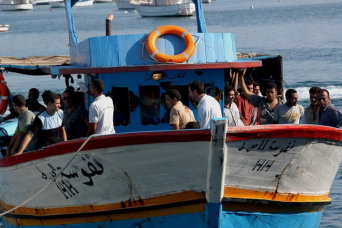- About
- Topics
- Picks
- Audio
- Story
- In-Depth
- Opinion
- News
- Donate
-
Signup for our newsletterOur Editors' Best Picks.Send
Read, Debate: Engage.
Starting this week the Italian search and rescue mission for migrants crossing the Mediterranean is set to come to an end, resulting in outrage in the human rights advocacy community at the idea of so many people dying senselessly right on Europe's doorstep.
The Italian authorities have said that their search and rescue effort, Mare Nostrum, is unsustainable without support from the EU. The mission, which made use of much of the Italian navy, rescued approximately 150,000 migrants over the last 12 months since the Lampedusa tragedy. Despite this significant effort, more than 2,500 others are thought to have drowned in the Mediterranean in that same period.
Mare Nostrum is yet to formally cease operations, however, as the Italian government is yet to sign off the decision and this could take months.
The mission has, in the meantime, been replaced by a significantly pared-back European-led mission codenamed Triton, which was launched on Saturday. This mission will not involve any search and rescue missions across the sea, but will only patrol within 30 miles of the Italian coast.
The new mission has only one third of the budget of Mare Nostrum (3 million euro as opposed to 9 million euro), despite eight EU member states pledging support.
This initiative sorely lacks the resources needed to cope with the huge numbers of people trying to make the journey by boat - let alone the EU's international responsibility to those escaping untenable circumstances.
The UK's Foreign Office made a statement justifying their decision not to support the Triton - aside from sending one intelligence officer to see how the operation runs - arguing that providing such comprehensive cover to migrants making the dangerous journey only encourages more to do the same.
This "drown a migrant to save a migrant" mentality fails to recognise the deeply distressing, dangerous circumstances in which asylum seekers decide to make such a treacherous journey.
For those fleeing the Islamic State, which has been carrying out brutal murderers on those who refuse to follow their doctrine, enlisting child soldiers and performing public beheadings, it is not difficult to see why a dangerous boat journey with the potential for settlement in a safe place seems like a viable option. Under those circumstances, any option out is a good option.
No human being facing persecution, violence or war should face a closed border. The EU really can do so much better.
